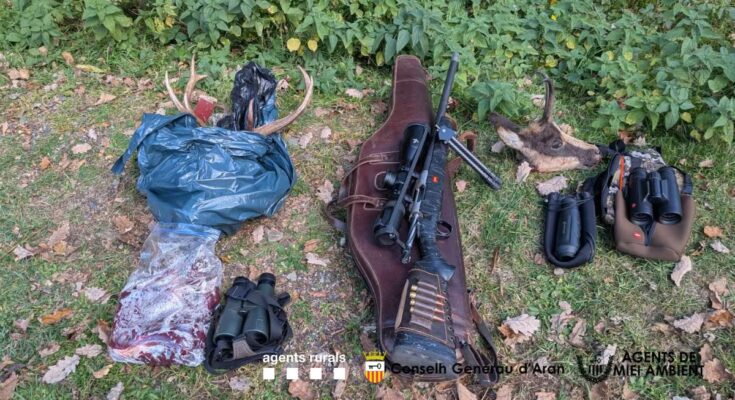The rural agents of the Val d’Aran and the Generalitat reported six hunters who engaged in organized and highly specialized poaching. These are three inhabitants of the valley who had obtained permission to hunt a Pyrenean chamois (Rupicapra pirenaica)a species found only in the Catalan Pyrenees and is one of Spain’s most valuable hunting trophies. This permit, free and non-transferable for residents of the area, can cost between 4,000 and 5,000 euros in the rest of Spain. The reported Aranese acted as guides for people coming from other areas so that they could hunt the chamois – in exchange for large sums of money, according to investigators – despite the valley’s regulations only allowing those who are residents or members of hunting societies to hunt them. This is the increasingly widespread practice of hunting or hunting tourism. The officers seized a deer and three hunted chamois. The defendants risk fines ranging from 3,001 to 120,000 euros.
The environmental agents of Aran and those of the Special Poisons and Anti-poaching Group of Rural Agents, aware of the existence of these illegal practices, carry out various planned and coordinated operations and one of these allowed the identification of several people involved in poaching activities in the Aranese territory. Since the suspects were hunting with a modus operandi In the upper areas of the valley, very professional, prolonged and complex monitoring was necessary to document the illicit activity with evidence.
During the inspections, the agents were able to verify that local hunters provided orientation and logistical support to populations coming from outside the valley, mainly for illegal chamois hunting. After several follow-ups and surveillance, two weeks ago a local hunter, precisely from Canejan, and another from Valencia were intercepted in the Toran valley. During the monitoring, the agents observed how the hunters had killed a male deer and a female chamois, whose head they had hidden among a pile of stones to recover it later and not arouse suspicion in case of inspection. The usual thing is that the next day, without being armed, the hunter goes to look for the hidden trophy.
The agents identified the two hunters and reported the local man for shooting a deer, for which they had a hunting permit, but did not seal it as required by law. The suspicion is that this way he can use it at another time. The hunter from Valencia was sanctioned for killing a female chamois without authorization. According to the officers, the determined and confident attitude of the criminals is proof of the vast experience they have accumulated in this illegal practice.
Days later, given new suspicions of clandestine activity, a new prosecution began against two local hunters, brothers and with the aggravating circumstance that one of them is an agent of the Mossos d’Esquadra, and two hunters from Puertollano (Ciudad Real). Surveillance was carried out in the Toran valley and the Salient area, where officers observed how hunters from Ciudad Real shot chamois. When they were stopped once the hunt was over, the two heads of the animals were found during the inspection of the vehicle. One of them had no seal and the other had attached it incorrectly, which could have allowed it to be manipulated and reused.
As it happens, this group has been under investigation for alleged poaching for more than seven years and has been credited with hunting at least 21 chamois and 3 deer in Val d’Aran since 2017. In these last two operations the agents seized parts, weapons and various objects used to carry out poaching, such as binoculars, thermal telescopes and other tools.
The Supreme Court establishes that poaching can constitute a crime, even if no game is captured, simply because of carrying out the hunting activity without authorization. According to current legislation, these acts can be considered very serious infringements, which entail fines of between 3,001 and 120,000 euros. Furthermore, the reported persons could be temporarily expelled from the corresponding hunting society and lose their hunting license for five years, which would prevent them from hunting in the whole of Catalonia during this period.
Hunting and fishing associations for the conservation and sustainable management of hunting activity in Val d’Aran have been repeatedly calling for greater control of bad practices for years. For its part, the Conselh Generau d’Aran, which collaborates with these bodies, reiterates the importance of all agents working actively to identify and report these practices to ensure responsible and respectful hunting of wildlife.
The regulation establishes that only those who are domiciled and are members of one of the two hunting and fishing societies in the valley can hunt Pyrenean chamois in Val d’Aran. They can request a permit for a single day – which will be drawn – and to hunt a single specimen and cannot be accompanied by a person from outside the valley or entrust the hunt to them.



